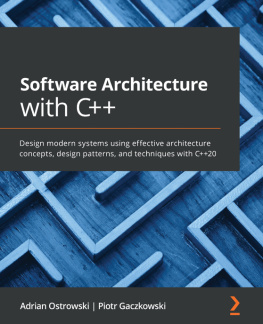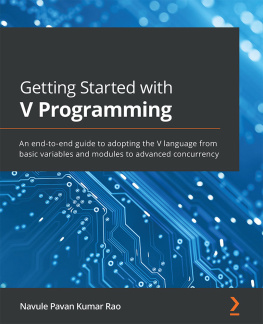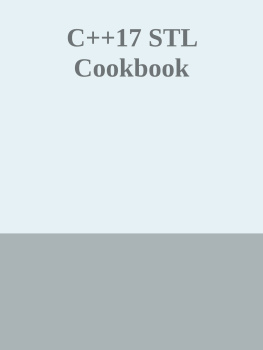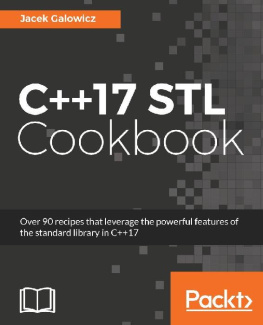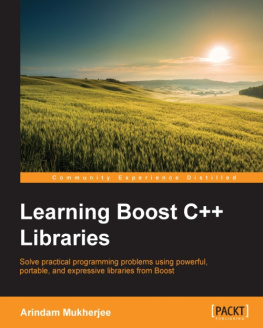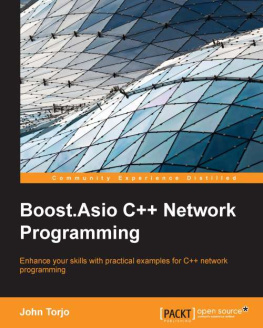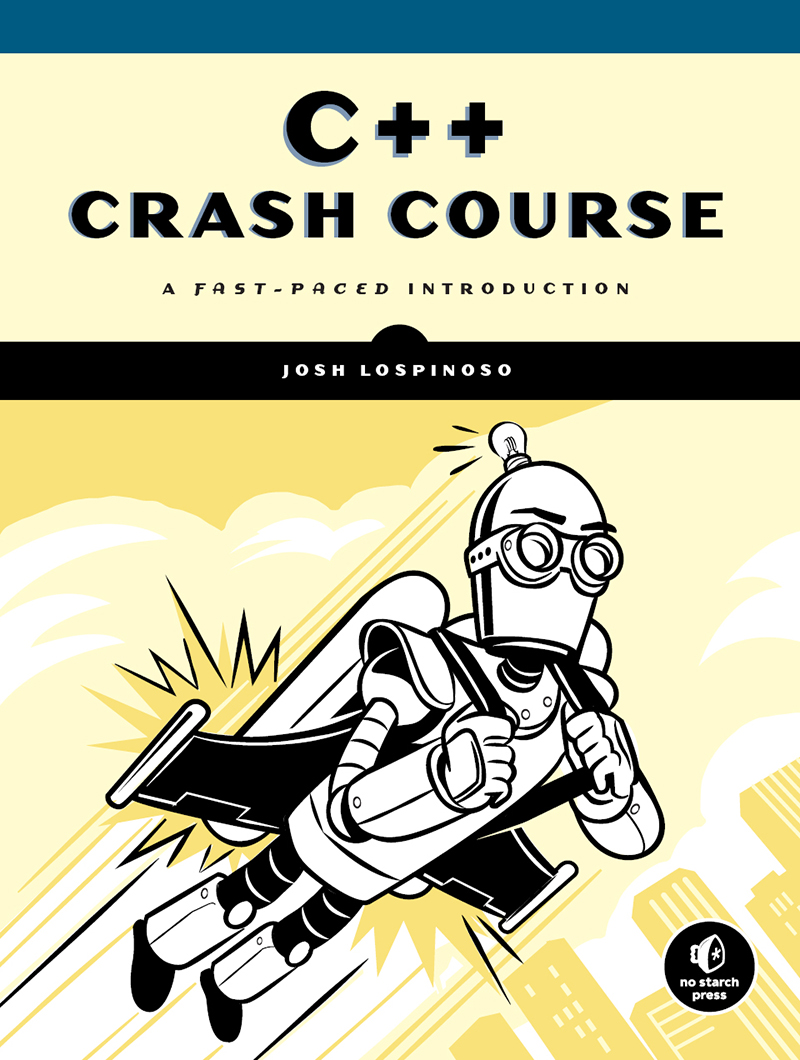Contents in Detail
C++ CRASH COURSE
A Fast-Paced Introduction
by Josh Lospinoso
San Francisco
C++ CRASH COURSE. Copyright 2019 by Josh Lospinoso.
All rights reserved. No part of this work may be reproduced or transmitted in any form or by any means, electronic or mechanical, including photocopying, recording, or by any information storage or retrieval system, without the prior written permission of the copyright owner and the publisher.
ISBN-10: 1-59327-888-8
ISBN-13: 978-1-59327-888-5
Publisher: William Pollock
Production Editors: Meg Sneeringer and Riley Hoffman
Cover Illustration: Josh Ellingson
Interior Design: Octopod Studios
Developmental Editors: Chris Cleveland and Patrick DiJusto
Technical Reviewer: Kyle Willmon
Copyeditor: Anne Marie Walker
Compositors: Happenstance Type-O-Rama, Riley Hoffman, and Meg Sneeringer
Proofreader: Paula L. Fleming
For information on distribution, translations, or bulk sales, please contact No Starch Press, Inc. directly:
No Starch Press, Inc.
245 8th Street, San Francisco, CA 94103
phone: 1.415.863.9900;
www.nostarch.com
Library of Congress Cataloging-in-Publication Data
Names: Lospinoso, Josh, author.
Title: C++ crash course : a fast-paced introduction / Josh Lospinoso.
Description: First edition. | San Francisco, CA : No Starch Press, Inc.,
[2019]
Identifiers: LCCN 2019020529 (print) | LCCN 2019022057 (ebook) | ISBN
9781593278892 (epub) | ISBN 1593278896 (epub) | ISBN 9781593278885 (print)
| ISBN 1593278888 (print)
Subjects: LCSH: C++ (Computer program language) | Computer programming.
Classification: LCC QA76.73.C153 (ebook) | LCC QA76.73.C153 L67 2019 (print)
| DDC 005.13/3--dc23
LC record available at https://lccn.loc.gov/2019020529
No Starch Press and the No Starch Press logo are registered trademarks of No Starch Press, Inc. Other product and company names mentioned herein may be the trademarks of their respective owners. Rather than use a trademark symbol with every occurrence of a trademarked name, we are using the names only in an editorial fashion and to the benefit of the trademark owner, with no intention of infringement of the trademark.
The information in this book is distributed on an As Is basis, without warranty. While every precaution has been taken in the preparation of this work, neither the author nor No Starch Press, Inc. shall have any liability to any person or entity with respect to any loss or damage caused or alleged to be caused directly or indirectly by the information contained in it.
#include #include #include int main() { auto i{ 0x01B99644 }; std::string x{ " DFaeeillnor" }; while (i--) std::next_permutation(x.begin(), x.end()); std::cout << x;}
About the Author
Josh Lospinoso, PhD, is an entrepreneur who served 15 years in the US Army. As a cyber officer, Josh wrote dozens of infosec tools and taught C++ to junior developers. He has spoken at a wide range of conferences, published over 20 peer-reviewed articles, is a Rhodes Scholar, and holds a patent. In 2012, he co-founded a successfully acquired security company. He keeps a blog and is an active contributor to open source software.
About the Technical Reviewer
Kyle Willmon is a systems developer with 12 years of C++ experience. He has worked in the information security community for 7 years utilizing C++, Python, and Go across a variety of projects. Kyle currently works as a developer for Sonys Global Threat Emulation Team.
BRIEF CONTENTS
FOREWORD
C++ is a complicated language. This is a reputation C++ has earned across a number of decades of use, and not always for the right reasons. Often, this is used as a reason to disallow people from learning C++, or as a reason why a different programming language would be better. These arguments are hard to substantiate because the basic premise they rely on is wrong: C++ is not a complicated language. The biggest problem C++ has is its reputation, and the second biggest problem is the lack of high-quality educational materials for learning it.
The language itself has evolved over the past four decades from C. It started off as being a fork of C (with minor additions) and a pre-compiler called Cfront, which compiles early C++ code to C that is then to be processed with the C compiler. Hence the name Cfrontin front of C. After a few years of progress and development, this proved to limit the language too much and work was undertaken to create an actual compiler. This compiler, written by Bjarne Stroustrup (the original inventor of the language), could compile a C++ program stand-alone. Other companies were also interested in continuing from basic C support and made their own C++ compilers, mostly compatible with either Cfront or the newer compiler.
This proved to be untenable because the language was unportable and wildly incompatible between compilers. Not to mention the fact that keeping all decisions and direction within the hands of a single person is not the way to make a cross-company international standardthere are standard procedures for that, and organizations that manage them. C++ was thus moved to become an ISO standard belonging to the International Standards Organization. After a number of years of development, the first official C++ standard came out in 1998, and people rejoiced.
They rejoiced for only a short while though, because while C++98 was a good definition, it had included a few new developments that people didnt see coming, and had some features that interacted in weird ways. In some cases the features themselves were well-written, but the interaction between common features was just not presentfor example, being able to have a filename as a std::string and then opening a file with that.
Another late addition was support of templates, which was the main underlying technology supporting the Standard Template Library, one of the most important pieces in C++ today. Only after its release did people discover that it itself is Turing complete, and that many advanced constructs could be done by doing computations at compile time. This greatly enhanced the ability for library writers to write generic code that would be able to handle arbitrarily complex deductions, which was unlike anything other languages in existence at the time could do.
A final complication was that while C++98 was good, many compilers were not suited for implementing templates. The two major compilers of the time, GNU GCC 2.7 and Microsoft Visual C++ 6.0, were both unable to do a two-step name lookup required by templates. The only way to fully get this right was to do a full compiler rewrite...
GNU tried to keep adding onto its existing code base, but finally went for a rewrite around the 2.95 time frame. This meant that there were no new features or releases for a multi-year period, and many were unhappy with this. Some companies took the code base and tried to continue its development, creating 2.95.2, 2.95.3 and 2.96all three of which are remembered for their lack of stability. Finally, the completed rewrite GCC 3.0 came out. It was not very successful initially, because while it would compile templates and C++ code much better than 2.95 ever did, it would not compile the Linux kernel to a working binary. The Linux community plainly objected to modifying their code to adapt to the new compiler, insisting that the compiler was broken. Eventually, around the 3.2 timeframe, the Linux community came around and the Linux world recentered around GCC 3.2 and up.


